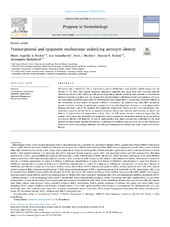| dc.contributor.author | Pavlou, Maria Angeliki S. | en_US |
| dc.contributor.author | Grandbarbe, Luc | en_US |
| dc.contributor.author | Buckley, Noel J. | en_US |
| dc.contributor.author | Niclou, Simone Pierrette | en_US |
| dc.contributor.author | Michelucci, Alessandro | en_US |
| dc.date.accessioned | 2020-04-03T08:43:33Z | |
| dc.date.available | 2020-04-03T08:43:33Z | |
| dc.date.issued | 2019-03 | |
| dc.Published | Pavlou MAS, Grandbarbe L, Buckley NJ, Niclou SP, Michelucci A. Transcriptional and epigenetic mechanisms underlying astrocyte identity. Progress in Neurobiology. 2019;174:36-52 | eng |
| dc.identifier.issn | 0301-0082 | |
| dc.identifier.issn | 1873-5118 | |
| dc.identifier.uri | https://hdl.handle.net/1956/21678 | |
| dc.description.abstract | Astrocytes play a significant role in coordinating neural development and provide critical support for the function of the CNS. They possess important adaptation capacities that range from their transition towards reactive astrocytes to their ability to undergo reprogramming, thereby revealing their potential to retain latent features of neural progenitor cells. We propose that the mechanisms underlying reactive astrogliosis or astrocyte reprogramming provide an opportunity for initiating neuronal regeneration, a process that is notably reduced in the mammalian nervous system throughout evolution. Conversely, this plasticity may also affect normal astrocytic functions resulting in pathologies ranging from neurodevelopmental disorders to neurodegenerative diseases and brain tumors. We postulate that epigenetic mechanisms linking extrinsic cues and intrinsic transcriptional programs are key factors to maintain astrocyte identity and function, and critically, to control the balance of regenerative and degenerative activity. Here, we will review the main evidences supporting this concept. We propose that unravelling the epigenetic and transcriptional mechanisms underlying the acquisition of astrocyte identity and plasticity, as well as understanding how these processes are modulated by the local microenvironment under specific threatening or pathological conditions, may pave the way to new therapeutic avenues for several neurological disorders including neurodegenerative diseases and brain tumors of astrocytic lineage. | en_US |
| dc.language.iso | eng | eng |
| dc.publisher | Elsevier Ltd | eng |
| dc.rights | Attribution CC BY-NC-ND | eng |
| dc.rights.uri | http://creativecommons.org/licenses/by-nc-nd/4.0/ | eng |
| dc.subject | Transcriptional mechanisms | eng |
| dc.subject | Epigenetic modifications | eng |
| dc.subject | Astrocyte differentiation | eng |
| dc.subject | Reactive astrogliosis | eng |
| dc.title | Transcriptional and epigenetic mechanisms underlying astrocyte identity | en_US |
| dc.type | Peer reviewed | |
| dc.type | Journal article | |
| dc.date.updated | 2020-01-28T10:18:16Z | |
| dc.description.version | publishedVersion | en_US |
| dc.rights.holder | Copyright 2019 The Author(s) | |
| dc.identifier.doi | https://doi.org/10.1016/j.pneurobio.2018.12.007 | |
| dc.identifier.cristin | 1701266 | |
| dc.source.journal | Progress in Neurobiology | |

